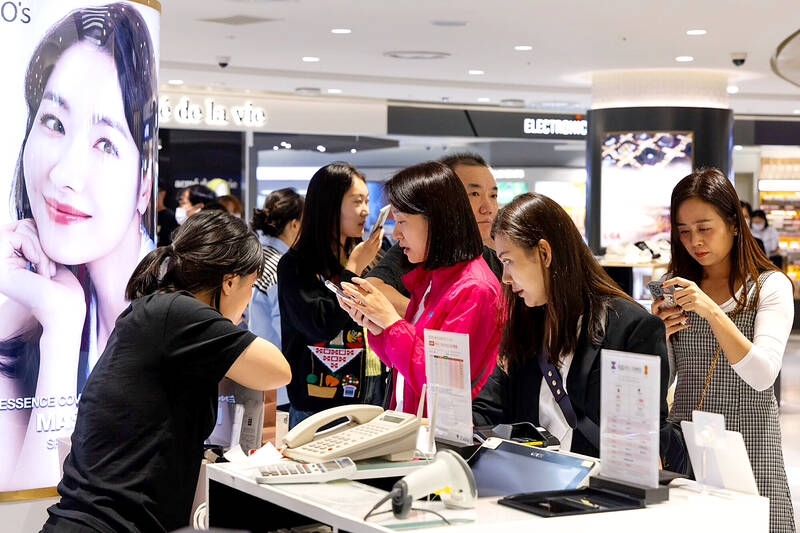We have had South Korean pop, film, fashion and food, and now the latest trend is “K-beauty,” with sales of South Korean skincare brands taking off in the UK as consumers are seduced by products that promise to conjure a radiant complexion.
Britons are cutting back their spending in other areas, but are still chasing what the beauty industry describes as the “glass skin” look, with retailers reporting a rise in spending on high-end skincare.
Demand for upmarket lotions and serums is up 13 percent on last year, the data company Circana said.

Photo: Bloomberg
“Everyone is talking about the trend for glass skin,” Circana UK account director Emma Fishwick said of the South Korean beauty phenomenon.
Elixirs that promise “hydration” and “moisture” are even more sought after, with sales up 15 percent, she said.
As products from South Korean brands such as Cosrx, Beauty of Joseon and Laneige go viral on TikTok, UK stores are racing to keep up. Boots, the UK’s biggest beauty retailer, is expanding its K-beauty range, with Skin1004 and Round Lab among the names being added to its Web site and going into selected stores next month.
Alice Rafferty, Boots’ director of luxury beauty and cosmetics, said: “The industry is evolving quicker than ever before, with new brands emerging and reaching cult-like status in a matter of weeks.”
K-beauty is expected to follow South Korea’s music, film and TV exports in becoming a blockbuster.
Demand is climbing almost 10 percent a year, and K-beauty is predicted to be a US$18.3 billion business by 2030, according to data compiled by the market research organization Straits Research.
South Korean beauty standards include “blemish-free, glass-like skin, a youthful complexion and minimal makeup or the appearance of [minimal makeup],” said Maria Mukaranda, beauty editor at the comparison site Cosmetify, where searches for “Korean skincare” are up 83 percent year-on-year.
Many people still stick to the standard three-step skincare routine — cleanse, tone and moisturize, but the South Korean way can involve 10 steps or more.
These include applying sheet masks infused with ingredients such as mugwort and ginseng on a daily basis, and layering on “essences” containing supposed wonder ingredients such as snail mucin or slime.
“For me, it all started with the popularization of the 10-step Korean skincare routine,” Mukaranda said.
“It was around 2021 to 2022 when this exploded online, and many of us were exposed to skincare this refined and extensive for the first time,” she added.

Tens of thousands of Filipino Catholics yesterday twirled white cloths and chanted “Viva, viva,” as a centuries-old statue of Jesus Christ was paraded through the streets of Manila in the nation’s biggest annual religious event. The day-long procession began before dawn, with barefoot volunteers pulling the heavy carriage through narrow streets where the devout waited in hopes of touching the icon, believed to hold miraculous powers. Thousands of police were deployed to manage crowds that officials believe could number in the millions by the time the statue reaches its home in central Manila’s Quiapo church around midnight. More than 800 people had sought

DENIAL: Pyongyang said a South Korean drone filmed unspecified areas in a North Korean border town, but Seoul said it did not operate drones on the dates it cited North Korea’s military accused South Korea of flying drones across the border between the nations this week, yesterday warning that the South would face consequences for its “unpardonable hysteria.” Seoul quickly denied the accusation, but the development is likely to further dim prospects for its efforts to restore ties with Pyongyang. North Korean forces used special electronic warfare assets on Sunday to bring down a South Korean drone flying over North Korea’s border town. The drone was equipped with two cameras that filmed unspecified areas, the General Staff of the North Korean People’s Army said in a statement. South Korea infiltrated another drone

COMMUNIST ALIGNMENT: To Lam wants to combine party chief and state presidency roles, with the decision resting on the election of 200 new party delegates next week Communist Party of Vietnam General Secretary To Lam is seeking to combine his party role with the state presidency, officials said, in a move that would align Vietnam’s political structure more closely to China’s, where President Xi Jinping (習近平) heads the party and state. Next week about 1,600 delegates are to gather in Hanoi to commence a week-long communist party congress, held every five years to select new leaders and set policy goals for the single-party state. Lam, 68, bade for both top positions at a party meeting last month, seeking initial party approval ahead of the congress, three people briefed by

Indonesia and Malaysia have become the first countries to block Grok, the artificial intelligence (AI) chatbot developed by Elon Musk’s xAI, after authorities said it was being misused to generate sexually explicit and nonconsensual images. The moves reflect growing global concern over generative AI tools that can produce realistic images, sound and text, while existing safeguards fail to prevent their abuse. The Grok chatbot, which is accessed through Musk’s social media platform X, has been criticized for generating manipulated images, including depictions of women in bikinis or sexually explicit poses, as well as images involving children. Regulators in the two Southeast Asian